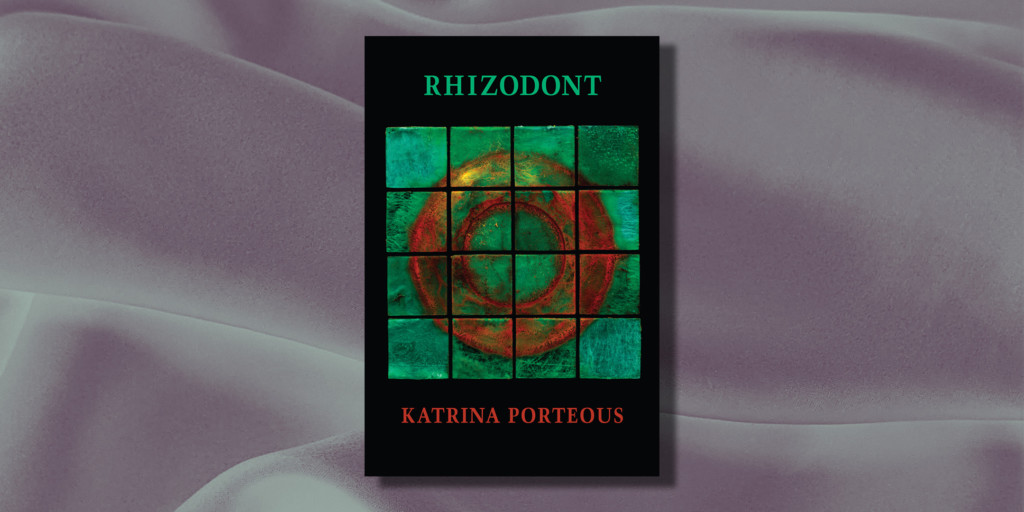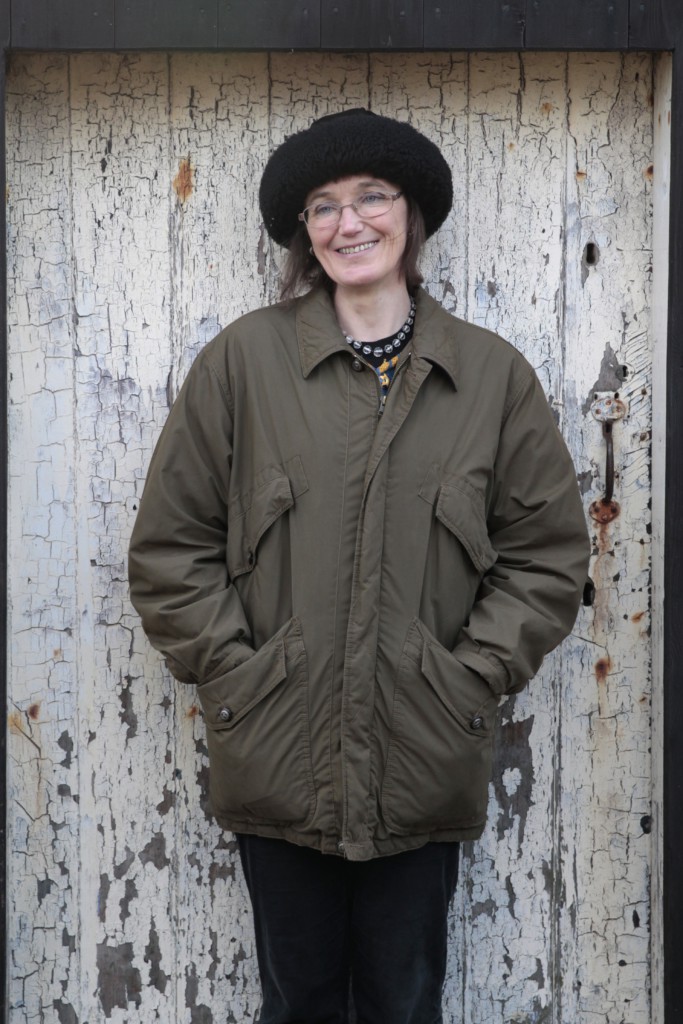Welcome to our Writers’ Notes for the 2024 T.S. Eliot Prize shortlist. These are educational resources for poets looking to develop their practice and learn from some of contemporary poetry’s most exciting and accomplished voices. Here’s Katrina Porteous on her collection Rhizodont.

To an Unknown Poet…
I feel rather shy about passing on ‘writing techniques and tips’. My degree was in History, not English, and I don’t teach poetry in a university. Nevertheless, I’ve been fortunate to cross paths with some exceptional teachers; so, I’ll begin with what they taught me. Geoffrey Hill read my terrible poems when I was 19. His lessons were twofold: first, that the formal constraints of rhyme and metre can be paradoxically liberating; and secondly – most important of all suggestions – that poetry should be understood primarily as music.
In America, Robert Pinsky’s lessons were also about music, but freer, more demotic. Always read your work out loud, to yourself, or better still to an audience. You will hear its weaknesses. Seamus Heaney’s lessons, too, were about listening: Robert Frost’s notion of ‘the sound of sense’, the meaning conveyed by abstract, muffled words behind a closed door. Heaney’s other piece of advice was to use the speech you hear at home as a source.
Listen
So my first advice to you is simply to listen. Always carry a notebook. Scribble things down. My own poems are full of direct quotations, and often take shape from speech rhythms, or from sounds around me. I sometimes even arrange informal interviews as a starting place. For the Durham poems in Rhizodont, I visited a primary school. ‘Where do you like to play?’ I asked the children. ‘What do you like to do?’ ‘What do you think about at night?’ Lee (not his real name) whispered that he knew the woodpeckers’ names. Lloyd (ditto) wanted to know how space could be infinite when everything comes to an end. The poetry is in their speech, and the poems grew from listening to them.
Now here’s a question. This method of working raises issues of ‘voice’ and ‘appropriation’. How can we write in a voice that is not the lyric ‘I’? Is a dramatic monologue even allowed? There are many distinct communities behind the poems in Rhizodont, which means that I often write from a place that is not exactly ‘me’. But I would not dream of writing in a voice that did not truly inhabit me. Durham voices, or those of Northumbrian fishermen, have soaked into me for decades. When I quote their words, I am trying to be true to them. In each case, I want their voices to speak.
The Voices
In this I feel a connection to Robert Frost and Edward Thomas. More strongly, I’m drawn to sources that also influenced Wordsworth – the anonymous ballad tradition of the Borders and, with it, Robbie Burns. Dylan, Springsteen, Joni Mitchell and Leonard Cohen are adjacent influences. I also love what radio can do with voices: Ewan MacColl, Peggy Seeger and Charles Parker making old traditions new with their Radio Ballads. It’s fantastic to take something traditional and to stretch its musical possibilities as far as they will allow.
So it’s not always literature which provides the model. The tempo, rhythms and tones of music might inspire you. You might find cinematic techniques useful: macro and micro scale, wide and close-up focus, unusual perspectives and edits. I thought about these things when I first stumbled across The Wasteland, with its multiple perspectives and voices.
Embrace Difficulty and Incomprehension
Many poems in Rhizodont began as commissions. I seek these out partly because constraint can be liberating: I like the terror of a deadline. I like to have a specific set of questions to answer, a subject I don’t know anything about to explore, and some sense of who I’m writing for. You can create similar conditions for yourself by setting yourself a theme, a time limit, and by writing with a particular person in mind. I like an audience who (as with radio or a podcast) will hear the work but might not read it on the page, or an audience which wouldn’t necessarily pick up a poetry book. It feels exciting and subversive to sneak in poetry where it’s not expected.
Translation is an important theme for me: mediating between one set of experiences, with its own language, and another. In recent years I’ve worked with scientific communities to try to translate their research to a general audience. For the poems in part two of Rhizodont,and those in my previous book, Edge, I would start from a piece of science writing, and try to strip away the jargon. I wrestled to understand the subject, and the poetry unfolded from that struggle. That is my next piece of advice to you: whatever you are writing about – whether it is an object, an emotion, a person, a situation – embrace difficulty and incomprehension. Begin from a place of unknowing, and work your way out. With luck, your reader or audience will accompany you in that process of discovery.
Big Theme? Small Example.
I’d advise any poet wanting to explore a big theme to focus closely on a small example. The poems in Rhizodont touch on huge subjects – species loss, ecology, climate – but they do so through local places I know well. The rhythms of the Northumberland coast where I live – its seasons, tides, weather, as well as its speech – are vital to my work. Roots matter. But in an age of globalisation the meanings of place and community are shifting. Much new poetry is engaged with uprootedness: displacement, migration, interrupted city rhythms. I hinted at this difference in the title of an earlier collection, Two Countries. I strongly feel that we live in a palimpsest of both: dislocation and migration, belonging and inclusion – and that poetry is an excellent medium to embrace this complexity. The poems in Rhizodont are rooted in place, but provisionality and impermanence suffuse them.
To write about place I often work outside, and if I am stuck with a piece of writing it is not words which help, but escaping from words, into sounds and smells and weather. Ted Hughes stirred something in my imagination early on. My next advice, then, is to get out into nature. A park, a garden, a clump of trees, a beach, a footpath over the moors. Anywhere you safely can. An exercise which I can recommend: pick up a pebble, or a leaf. Immediately your busy mind says, ‘stone’, or ‘leaf’, and stops you seeing what is really there. Get rid of words. Slow down. Try to experience that object with each of your senses in turn. How does it feel to hold, its weight, its temperature? What sounds does it make as you handle it? How does it smell? This level of close engagement with the physical world always helps me. In writing, you translate those sense experiences back into words.
Irreconcilable Differences, Unexpected Connections
Finally, poetry can grow from putting dissimilar things together. Metaphor often works that way. Collaborations may be good for generating dissimilarities. In ‘Under the Ice’, I worked with a composer who came up with surprising, often jarring, sounds, presenting me with unexpected analogies. The poems in part two of Rhizodont, which deal with new technologies, robotics, AI, and with the use of those techniques to understand global climate patterns, are quite different from the poems in part one. And yet I hope the two parts illuminate each other. They explore the same themes – survival, extinction, transformation – from different perspectives, using shifts of focus, micro to macro, human to non-human. Putting the book together was like writing a poem – exploring seemingly irreconcilable differences, revealing unexpected connections while translating between the two.
The Poetry School and T.S. Eliot Foundation have long collaborated on celebrating the T.S. Eliot Prize shortlist, highlighting this major fixture in the poetry calendar as a fantastic way into the art form and an opportunity to learn from poets at the top of their craft. This year we have a series of Writers’ Notes from the shortlisted poets, alongside a special one-off course with the fabulous Rachel Long, specifically focused on reading and writing after the shortlisted book, Adam by Gboyega Odubanjo. Additionally, we also have an exciting generative workshop exploring the whole shortlist as inspiration for new writing with T.S. Eliot Prize-winner, Joelle Taylor!

Katrina Porteous lives on the Northumberland coast and writes from a deep commitment to place and community. She has collaborated with musicians in many genres and is President of the Northumbrian Language Society. Her collections from Bloodaxe include The Lost Music, Two Countries, Edge (poems written for a planetarium), and Rhizodont, shortlisted for the T.S. Eliot Prize 2024.
Add your Reply
You must be logged in to post a comment.